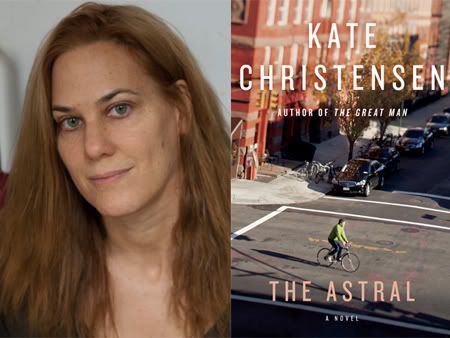
In A Sentence:
Kate Christensen demonstrates that middle-aged white male crises can not only be riveting, but entertaining as well.
Plot In A Nutshell:
Harry Quirk is tossed to the street by his wife, Luz, who secretly reads Harry's latest book of torrid love poetry and takes it as evidence of an affair. Harry is forced to reinvent himself despite being completely broke, abandoned and uninspired. Also, his son falls in with a cult.
Review:
It's been a while since I've read a "literary" novel, and certainly there are expectations with that sort of novel -- a slower pace, meditative plotting, and a whole lot of character insight. Well, Kate Christensen pulled a fast one on me. She drew me in with some of the most exquisitely beautiful prose in recent memory and then introduced, surprise!, a lot of comedy and a lot of action.
Harry Quirk is certainly pulled along by tides he cannot control, but what makes the novel nearly un-putdownable is the sense that we are watching a man slowly become an actor in his own drama, a man who long ago ceased to exist as a unique human being and became, instead, a series of traits: married man, poet, failed poet, failed husband, father, native Brooklyn-ite. Christensen peels the layers back on him as he undergoes his own enlightenment and really tries to understand who he is now.
But while that certainly makes the novel unique in the mid-life crisis genre, there is a moment in the last 3rd of the novel where Christensen sets completely unpredictable plot points in motion and creates something really special. Suddenly, it is revealed that we cannot trust Harry as a narrator--his memories are certainly blinkered, but more importantly, his very view of self is completely false. We are lulled into a sense of security as we follow Harry, listen to his opinions, get his view on complicated relationships, but it's all lies. Or, if not lies, then certainly a very complicated façade that proved so successful that even he believed it.
I know I'm making this sound all navel-gazy, but there's definitely more to the novel. Harry, abandoned by all of his oldest friends, is forced to associate with his daughter and her friends, entering a generation which he doesn't understand but at least tries to accept. His son's crises of conscience ties directly into Harry's philosophical troubles with Luz, pushing him into the arms of fundamentalist cult (stay tuned on this one, it goes places you wouldn't expect).
The novel begins with the position that the only honesty is in honest belief, and slowly it is revealed that every belief held by every one of the characters is fundamentally tenuous and always open to compromise. Everyone's a hypocrite, in often surprising ways. It makes you wonder, is this what happens to everyone? Do we all build up a series of painted faces as we get older, revealed to us as masks only if we go through a major, life-changing crisis like an illogical divorce?
I have my own opinions on this, but I am only in my quarter-life crisis. I wonder how older readers respond to the novel. Weigh in in the comments!

